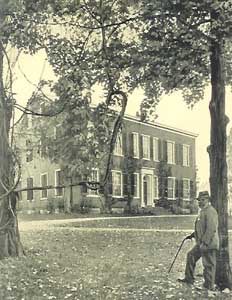
We’ve blogged in the past about Kentuckians’ varied reactions to epidemics of disease. In 1833, cholera’s assault on Federal Hill in Bardstown left permanent scars on the surviving members of the Rowan family. During an outbreak in Bowling Green in 1850, by contrast, a young man affected amusement as he witnessed some rather chaotic attempts at social distancing. Somewhere in the emotional middle was a Scott County native taking public health training in Philadelphia during the influenza epidemic of 1918; struggling with illness himself, he nevertheless viewed the deluge of cases at the city’s hospital as interesting subjects for clinical study – if they didn’t die first.
At home in Arkansas in 1835, Jane Washington Walker must have been dumbstruck when she read her mother’s letter. “The cholera has been among us,” wrote Rebecca Smith Washington from Russellville, Kentucky, as the scourge turned her town into “a Great House of Mourning.”
In language reminiscent of those reporting from today’s virus “hot spots,” Rebecca proceeded to recount in grim detail what the disease had wrought. “It broke out last Friday night three weeks ago with great violence, in twenty four hours there was nine widows left to mourn the sudden death of their husbands.” What followed was a parade of names—all known to Jane—and all dead: husbands, wives, children, neighbors, acquaintances, enslaved people. The disease initially “raged more violently among the Negroes than the White people,” her mother reported, and those who had somewhere to escape to had quickly left town. Rebecca closed her school. Stores “shut up, their owners either dead or fled to the country.” Those who remained were fearful of contact with others. Though she “felt like I was signing the death warrant of a great part of my family,” Rebecca nevertheless agreed to shelter the family of a man helping to nurse the sick. She praised the other first responders of the day, even though they could do little to alleviate the suffering. “The young men performed every office male and female,” she observed, from tending the victims to making coffins out of boxes and planks, digging graves and burying the dead.
The epidemic was subsiding, but Rebecca’s lingering shock was still evident. As she watched merchants begin to reopen their stores, and townspeople return to their deserted (and in some cases, burglarized) homes, her thoughts were of her loved ones. She had long contemplated pulling up stakes and moving to Arkansas; now that “life has become so uncertain,” her desire to do so was overwhelming. “I shall never enjoy life again,” she wrote Jane, “until I join you.”
Click on the links to access finding aids for these collections, part of the Manuscripts & Folklife Archives of WKU’s Department of Library Special Collections. For more collections, search TopSCHOLAR and KenCat.
